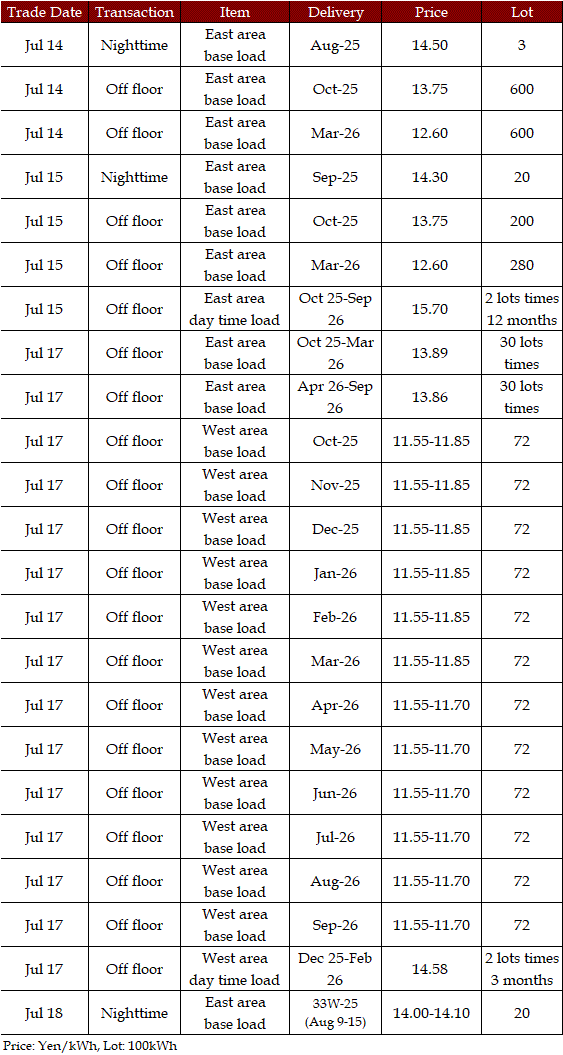Power: Jul 14-18: Spot prices fall in East and West on eased hot temperatures
|
In the day-ahead market on JEPX (Japan Electric Power Exchange), the 24-hour spot power prices on a weekly average basis for Jul 14-18 delivery fell from the previous week in East Japan (50Hz) as well as in West Japan (60Hz). Easing hot temperatures lowered demand for air conditioning and enhanced power reserve, making power more available in the market and then lowering prices. In West Japan, due to the torrential rain caused by linear rainbands locally, some utilities halted pumped-storage power generation (hydroelectricity); however, it affected prices little.
In Tokyo and Kansai, the key areas in East Japan and West Japan, the 24-hour average posted a difference in favor of the East by Yen 0.24 for Jul 14 delivery, by Yen 0.75 for Jul 16 delivery, by Yen 1.02 for Jul 17 delivery, and by Yen 0.75 for Jul 18 delivery; for Jul 15 delivery, the difference was in favor of West by Yen 0.87.
The fuel market trends in the third week of July were detailed as follows.
DES Northeast Asia spot LNG prices retreated to mid-$12's per mmBtu for prompt September 2025 delivery as of Jul 17, down about $0.4 from the end of the previous week (Jul 11). The softened natural gas markets in Europe lowered the DES Northeast Asia market; however, a spell of inclement hot weather in the Northeast Asia increased gas demand for air conditioning, deriving a higher outlook among some players. The Ministry of Economy, Trade and Industry (METI) announced on Jul 16 that Japan's LNG inventories for power generation stood at 1.88 mil mt as of Jul 13, down 10,000mt from a week before. The figure was below from 1.94 mil mt as of the end of July last year and from the average of the past five years at 2.15 mil mt.
FOB Newcastle thermal coal prices in Australia edged lower by around $0.5 from the end of the previous week to mid-$111's for July 2025 loading as of Jul 17. Prices moved in tandem with gas prices.
In the crude oil market, WTI crude for August 2025 stood at mid- $67's per barrel as of the morning of July 18, while Brent crude for September 2025 was trading at mid- $69's. Prices dipped by around $1.0 from the end of the previous week for WTI and for Brent. Many bearish factors through the week, such as the easing worries about the sanction against Russia by the US, the appreciation of US dollars, and the increase in inventories of products in the US lowered the crude futures market.
The actual highest price during the week was at Yen 31.50 in the Chubu, Hokuriku, and Kansai areas for Jul 15 delivery. Meanwhile, the actual lowest price during the week was at Yen 0.01 in the Shikoku area for Jul 15 delivery.
By area, the weekly average of the 24-hour spot prices was at Yen 13.19 in Hokkaido, down Yen 0.69 from the previous week; Yen 13.16 in Tohoku, down Yen 0.81; Yen 13.25 in Tokyo, down Yen 2.42; Yen 13.26 in Chubu, down Yen 2.58; Yen 12.87 in Hokuriku and Kansai, down Yen 2.97; Yen 11.12 in Chugoku, down Yen 2.91; Yen 8.18 in Shikoku, down Yen 5.55; and Yen 10.46 in Kyushu, down Yen 3.42.
In the JEPX auction, volumes of offers were 1,306.51 mil kWh on a weekly average basis, up 6.9% from the previous week. Meanwhile, bids on a weekly average basis decreased by 4.6% to 1,093.15 mil kWh. The weekly average of trade volumes recorded 870.36 mil kWh, down 2.6%.
Power demand in nine areas of Japan during Jul 14-18 was a combined 13,238.50 mil kWh, down 6.9% from 14,221.74 mil kWh during Jul 7-11. The figure was up 2.6% from the corresponding period a year earlier. Demand during Jul 15-19, 2024 after day of week adjustment was 12,847.86 mil kWh.
Deals reported on TOCOM (Tokyo Commodity Exchange) during Jun 14-18 were as below.
Deals reported on EEX (European Energy Exchange) during Jul 14-18 were as below.
Deals reported on EEX (European Energy Exchange) during Jul 14-18 were as below. In the fourth week of July, spot prices were expected to run above from the third week of July. The high temperature in the fourth week was expected to exceed 35 degrees Celsius almost every day in many areas, growing air conditioning demand and affecting prices. The return of thermal power plants from inspections along with more photovoltaic power plant outputs, however, might mitigate upside momentum in prices through enhancing power reserve. Asked about the outlook for the fourth week of prices, a source at a power producer and supplier said, "Scorching weather in many areas will post an upward trend in prices; however, we assume prices won't surge as the prices have so far. High prices of Yen 35's in early July will be unlikely to come. In Tokyo, the base load prices for the fourth week will hover at around Yen 15; in Kansai, prices will be either the same as Tokyo or cheaper by Yen 0.5."
|
||||||||||||||||||||||||||||||













